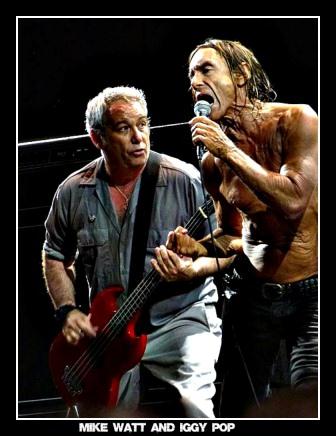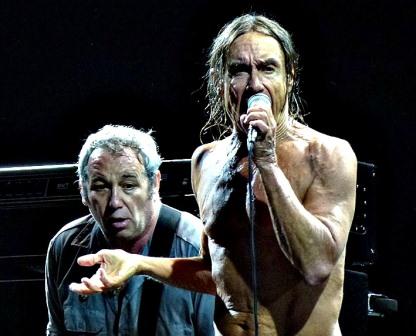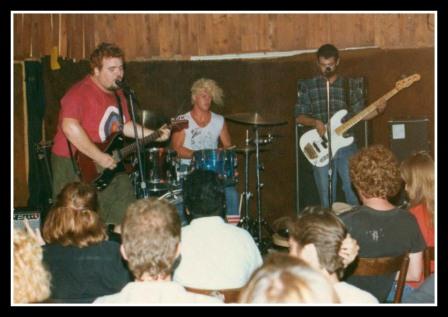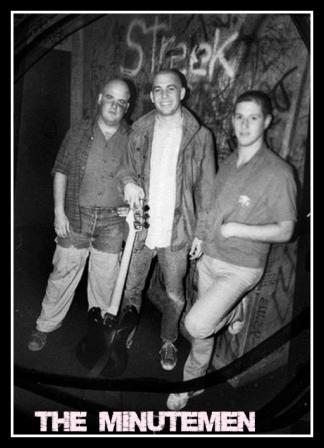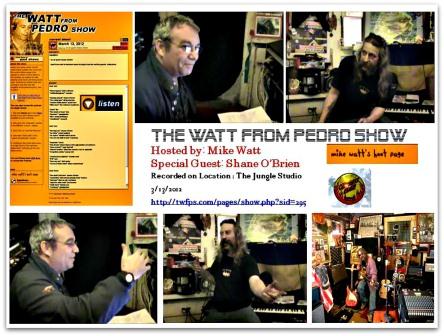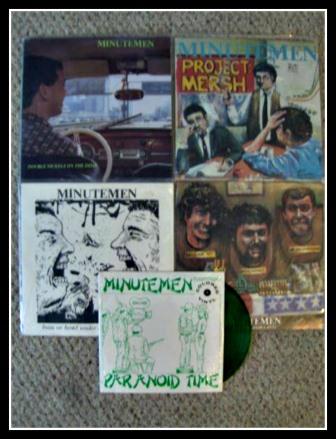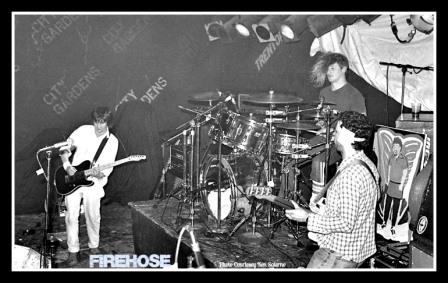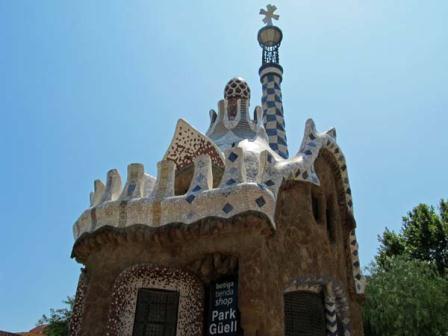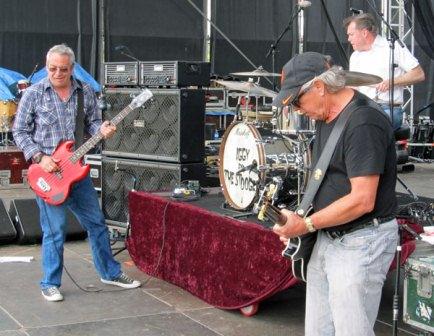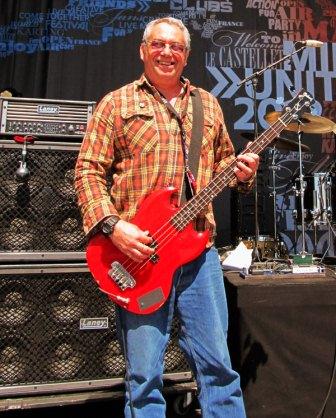
| |||||
|
I contacted Mike Watt to show him my review of his book, "On and Off Bass" and asked him if he'd like to do an interview. I was excited beyond belief when he said yes, so I hope the results excite and interest you all. We talked on Skype about music, poetry, growth, and creativity. I learned as much from transcribing this interview as I did from conducting it. A huge thanks to brother Watt for featuring my poetry on his Watt from Pedro show in July. Have a great read!
|
Punk Globe: Hey Mike, thanks for agreeing to do this interview. Please tell us a bit about yourself and your bands.
MIKE WATT: I started out here in San Pedro in music with my friendship with D.Boon. Punk came around the time we graduated from San Pedro High School in 1976, and then we made a band called The Reactionaries. A couple years later, in January of 1980, we started band called The Minutemen with drummer George Hurley. Actually, we had another drummer before him, a welder by the name of Frank Tonche but he only lasted two gigs.
Punk Globe: What happened to him?
MIKE WATT: Well, he said the punk scene was too weird. After the second gig, he ran off. I ran into him about ten years later and he said, “I shouldn’t have left,” but it’s okay, he’s a great guy. The Minutemen lasted for one month short of six years, until D.Boon was killed in a van wreck.
Punk Globe: You quit music for a while after that, didn’t you? What made you want to start playing again?
MIKE WATT: Thurston [Moore] invited me to the studio when Sonic Youth were doing “Evol,” then we did a project together called Ciccone Youth. Then this kid named Edward fROMOHIO came to my house. I didn’t know that you had to pay to keep your phone number unlisted, so he called me up, came over and we started a band called fIREHOSE with George Hurley and we did that for about seven years.
Punk Globe: Didn't fIREHOSE do a series of reunion gigs recently?
MIKE WATT: Yup, we did two weeks of gigs. That was the first time I played with Ed fROMOHIO and George Hurley in eighteen years. It was very difficult. They're songs that I don't play much anymore,but it was good for me to go back and play my old music with old band mates. It was a good test. Edward lives in Pittsburgh now, so he came out and did two weeks of practice for two weeks of gigs. It was still pretty tough, I had to focus much on George Hurley.
MIKE WATT: Tight. I did an album with George in January called Unknown Instructors We also did some Minutemen songs in England together not too long ago. He's one of the best personal style drummers there is. He's very unique
Punk Globe: When you did those Minutemen songs in England, did you feel like the spirit of D. Boon was there with you?
MIKE WATT: I felt like we played it better for him. When I was in fIREHOSE I played with a pick, with Minutemen I used nothing. Both the Minutemen and fIREHOSE gigs were tough. When a of of years go by, you kinda change. It was still good training, you know. Life is about always learning, even if it means going back and re-learning your old stuff.
Punk Globe: That reminds me of Walt Whitman's whole ethos. When he edited "Leaves of Grass," he never took anything out and just kept adding to it. Do you feel that kind of deepening going on in your work?
MIKE WATT: Well I think it's like vocabulary, you learn new words and you don't really get rid of the old ones. That's a great point you make because the other thing's kind of a zero-sum game where you have to lose something to learn something. There are parts of life that are about that, but I don't think that goes for all experience.
Punk Globe: How did your label, clenchedwrench start?
MIKE WATT: It goes back to the old days when me and D. Boon started New Alliance, we just put the records out. I had so much new music to put out and I didn't want to have any roadblocks hindering it. I've got a lot of new collaborations and projects coming.
Punk Globe: What were you cooking up in the recording studio the other day?
MIKE WATT: I was on this project with this cat named Christian and Cedric from Mars Volta called Heavyweight. I didn't know Cedric was a drummer before this, I thought he was just a singer. This guy Christian is from a band called Triclops! in San Fransisco. They gave me eight songs with guitar and drum tracks and said, "Hey, could you put some bass on it?" I put the tracks down not knowing who really was playing on it. You can collaborate differently nowadays by trading files over the Internet.
MIKE WATT: It creates opportunities because you don't need to be in the same room. I gave it my all, it wasn't like, "I don't know who this guy is so I'm not gonna do my best," but it was a trip when I found out who was playing on it. We did another version of it with Stephen Perkins from Jane's Addiction on drums.
Punk Globe: Will it be released on clenchedwrench?
MIKE WATT: No, this is more of Christian's project. Sometimes you're doing the paddling and the other guy's the coxswain, sometimes you're the coxswain. Life's about taking turns, you know. You meet these guys in music and everybody's got their own path, it's very interesting.
Punk Globe: What have been some of the most interesting intersections you've had on your path with other people?
MIKE WATT: Well, they're all valid. I've come to the point in life where I understand that everybody's got something to teach. I keep my mind open to it, I keep my bass open to it. It can be a challenge, when you're doing this a long time you just want to keep bringing new creative things to the collaboration. Like you said, it's the intersection of two paths. In creativity, I don't think there's any shortcuts, it's just tough. I think that's why Mr. Whitman was always working on "Leaves of Grass." Even though I like the 1855 edition the best, it's the most econo with only eleven poems, I understand why he kept working with it. Work as a verb here, but also as a noun, which is really about his life's work.
Punk Globe: How did you first come across Walt Whitman?
MIKE WATT: You're told about him in school a bit, because he was one of the most recognized U.S.poets. The thing is, they really don't get too deep into him. In the first edition, he had an amazing introduction where he tells you that he wants to stop the Civil War with this poem. I was never told that as a kid. My journey to explore Mr. Whitman was to find out all I could with what little info I had because it struck me how contemporary his work still is even though it was written a hundred and fifty years ago. Then I found out the practical stuff, how he was DIY, you know, self published guy. So it was like this punk thing that we were doing, but a hundred and fifty years ago. I felt like I was in the same trench with him in a way. Like with Richard Meltzer and Ray Pettibon, they're not bass players, but they're artists expressing themselves, so we're part of the same movement. Maybe as a younger man, I couldn't have been there. My mindset had to be different to absorb Whitman differently.
MIKE WATT: I had never been to a funeral before. I didn't go to my father's or D. Boon's, but I went to Ron Asheton's. I read these words because they were the first ones to really smack me. The Yankee clipper is under her sky-sails—she cuts the sparkle and scud; My eyes settle the land—I bend at her prow, or shout joyously from the deck. The boatmen and clam-diggers arose early and stopt for me; I tuck’d my trouser-ends in my boots, and went and had a good time: (You should have been with us that day round the chowder-kettle.) and then at the end of "Leaves of Grass, he says: I bequeath myself to the dirt, to grow from the grass I love; If you want me again, look for me under your boot-soles. You will hardly know who I am, or what I mean; But I shall be good health to you nevertheless, And filter and fibre your blood. Failing to fetch me at first, keep encouraged; Missing me one place, search another; I stop somewhere, waiting for you. It made me cry when I read that, just his constant hope and insight. I often thought when I was discovering this stuff, if there's anything I like about the U.S. it's in this poem. Punk Globe: What made you want to start writing free verse poetry?
MIKE WATT: First I started writing lyrics to songs, but poetry isn't words to music, poetry is the music. Lyrics and poetry live in their own worlds. It's not that one's better than the other, they're just different. Whitman had these long prosaic lines, but they still had a rhythm to them. They are like passages from a book, but I think he was trying to break from conventions of old ways of presenting poetry instead of saying "I'm gonna write a poem that's more like a longer book"
Punk Globe: Your poetry doesn't actually seem that influenced by Whitman in terms of form or style. It bears more resemblance to Gary Snyder, Galway Kinnell, and William Carlos Williams. Were you influenced by any of those guys at all?
MIKE WATT: Yeah, I've read them I think I am closer to that. There's such a strong voice to Whitman's style, that's a kind of courage that I'm still working up to.
MIKE WATT: I met him twice, but I never really got the chance to sit and talk with him. He did a book signing in West Hollywood and I shook his hand and thanked him for being a poet. He came to a gig that Minutemen did with Black Flag in New York in 1982. Henry Rollins and I said, "Pleased to meet you Mr. Ginsberg," and that was all. I've gotten to be good friends with a guy named Charles Plymell who was friends with Ginsberg and he told me a lot of stories about him. The Beats were very much like punks, they had their own personality.
Punk Globe: I remember this quote that you said in the movie "American Hardcore" about coming up in the 70s and expecting it to be like the 60s, but you got there and it was Peter Frampton in a kimono.
MIKE WATT: Yeah, I was 13 in 1970 and by then rock and roll had moved out of the clubs and garages into the arenas. So that was what attracted me to the punk scene, it was back in the hands of the musicians and fans.
Punk Globe: When you were coming up in the 70s, were you a big Stooges fan?
MIKE WATT: Fun House was the first one I heard. That record was wild, a lot of people didn't like back then. it was a mindblower, we used to say that the first three songs were the same song played differently. It was so crazy, kind of like Captain Beefheart in a way. When punk came, we thought these guys were already doing it, they just didn't have that name tag.
Punk Globe: What was it like when you first started playing with The Stooges?
MIKE WATT: I would have never imagined that happening. Life's a trip.
MIKE WATT: It's really helped me become a better bass player. Iggy's kind of like a conductor, he sees the big picture. Sometimes when you're operating the machine, you don't see the trees from the forest. I learn a lot from all of them, Ig about culture, Steve Mackay about politics, Scott about nature, Ron knew a lot about history. James Williamson is also a very nice dude. Musically very independent, you know, not part of the herd. Them being from the midwest I think makes them very straightforward. Every gig I try my hardest, you know, here's the legacy of The Stooges. Am I gonna play lame? It's an integrity builder for me, I never take it for granted.
Punk Globe: Are you excited to get back on the road?
MIKE WATT: Yeah, we're going to Italy, Germany, Belgium, Sweden, and France.
Punk Globe: Do you always bring a camera on tour with you?
MIKE WATT: Yeah I do. I try to take shots everywhere I go. I don't always have a bike or a kayak to get around, but I don't live in those places so I try to capture them. I was just in Barcelona and I saw the Gaudi stuff and a lot of the museums, so I tried to get pictures of that. Gaudi is a big inspiration, through the first and second world wars and the Franco regime he just kept making art.
Punk Globe: Do you think that in difficult times people need to make art to cope with change?
MIKE WATT: Yeah, art is the fabric between humans when the material stuff fails.
MIKE WATT: You gotta filter stuff out to get a quality focus, but you can't be unaware. There's a discipline to it. Luckily, you've got other artists putting their own expressions out there. I'm more attracted that than some commercial shit on the television. There's interesting ways of presenting critical information rather than using it to sell you something you don't want.
Punk Globe: What are some of the most interesting photos you snapped on this past leg of the tour?
MIKE WATT: We were in Athens, Greece after Barcelona and in the town in Hungary where they first cut the fence that led to the demolition of the Berlin Wall. The gig was kind of in the forest, so I didn't get pictures of the town or anything. These days Athens is looking pretty rough. Police in riot gear ride two by two on their motorcycles. The audience at the gig was very happy, but you could tell that there was a heaviness in their town. I was in England and it rained every day. they were getting ready for the Olympics, so there was a lot of police crackdown there too. These are very heavy mental pictures, hard to capture with a camera. Here we are to play a festival sponsored by beer companies and mobile phone companies and have a good time. Ig played his heart out in front of those crowds.
Punk Globe: My sister took a bunch of pictures of protests in Barcelona. What kind of protests did you see?
MIKE WATT: The hotel that we were at in Athens had a strike while we were there. You could feel that urgency, everything's not a-okay. I also feel like we're not alone, you hear people talk like "If we could just get rid of those people over there, everything would be alright." The thing is, though, we're all in this together.
MIKE WATT: Oh yeah, I do miss my town. I miss the familiarity of the ocean. You do need to leave from time to time to appreciate it. Pedro's part of me, but I can't be there a hundred percent of the time. It's good to see other lands and be in other people's towns. Everybody's got their own solutions to the problems we all share. While I'm away from my town, it's time to learn.
Punk Globe: John Coltrane comes up a lot in the quotes and poems in “On and Off Bass,” can you speak to his influence at all?
MIKE WATT: It seems to me that he's the embodiment of what I like about what a musician is. He was on a search for the truth and he never compromised on that. The man did ten hours of practice a day, he'd even practice after gigs. I met a guy from Japan who saw him in Hiroshima and said he did a two and a half hour show, then went backstage to get his album signed and Coltrane had a towel wrapped around his head as he was practicing. For Coltrane, it wasn't some gimmick to service a lifestyle, he directed his path toward the truth. Raymond Pettibon turned me on to that music, I grew up in a house where I wasn't exposed to bebop. When he first played it for me, I thought it was older guys doing punk rock. I didn't know he was dead, but the emotion felt like what we were doing in the punk scene. Sometimes people come into my life and bring great music and literature with them, like when D.Boon played me all that Creedence.
Punk Globe: What would you say to people who cling to punk and think just because they like that, they can't enjoy Coltrane or Creedence or anything else?
MIKE WATT: I don't blame them if that's the way they feel, but I was in the original 70s scene where there were a lot of people who brought in glam and glitter and art. They exposed me to all kinds of music that I had never even heard of. A lot of the original punk rockers were people who just didn't fit in. It's weird that some people would want to turn it into a club where you have to fit in. It almost seems like the opposite of what it was intended to be. Humans do this, you know, no matter what we start something off in the name of, it ends up becoming some kind of clique. The way I see the movement is that everybody makes up their own mind about John Coltrane and that's okay. If someone doesn't like it, I'm not gonna tell them they don't belong. There are all kinds of people in the movement.
MIKE WATT: Big time. People wanted to kind of invent their own world, they'd make up fake names like Darby Crash. You know, first he was Bobby Pyn. The way southern California is, it's really spread out. It's like a hundred and fifty towns, but if you fly over it it looks like one town. You had these people coming from all different parts and they all had their own way of doing it, but the one thing we all had in common was Stooges. I have a guy who comes to my gigs named Dr. Leonard and he's in a wheelchair. The music scene's a big part of his life, man. I think people with challenges like that learn not to take things for granted so much. They really look for something deeper in life. Sometimes you gotta get hurt to understand some truths. Sometimes having a stable mind and body can be a disability in itself because you get shallow. When you're in a body long enough, it starts to wear down. The last couple years I've had a bad knee. Blew my knee out at a Stooges gig, so that's been a little challenge for me. I can't really run, but I do what I can. You live your whole life healthy and strong and all of the sudden, you have to think way in advance about things you never had to think about before. It's, should I go up these stairs or use that hand rail? I think it's a part of the deal and it's got something to teach me. You know, there's a reason for it.
Punk Globe: If you had one thing to say to every bogged down, bummed out person who might read this, what would it be?
MIKE WATT: I wouldn't be so sure of you thinking you're bogged down. I'm not trying to say I know more than anybody else, but be a little unsure on that and try some creative stuff that could liberate the situation. Don't let it stomp the spirit down because the situation is bad. You never know, you turn a corner and all of the sudden that perspective is different. You gotta give yourself a chance. What I'm talking about in a trippy way is a kind of humility, but at the same time an assertiveness too. You gotta believe in yourself, but you can't be too high and mighty about it. Like a skateboarder, if you fall down you gotta get back up. So the knowing is kinda in the doing.
Punk Globe would like to thank Mike Watt for the fascinating and informative interview...
|
|
|
